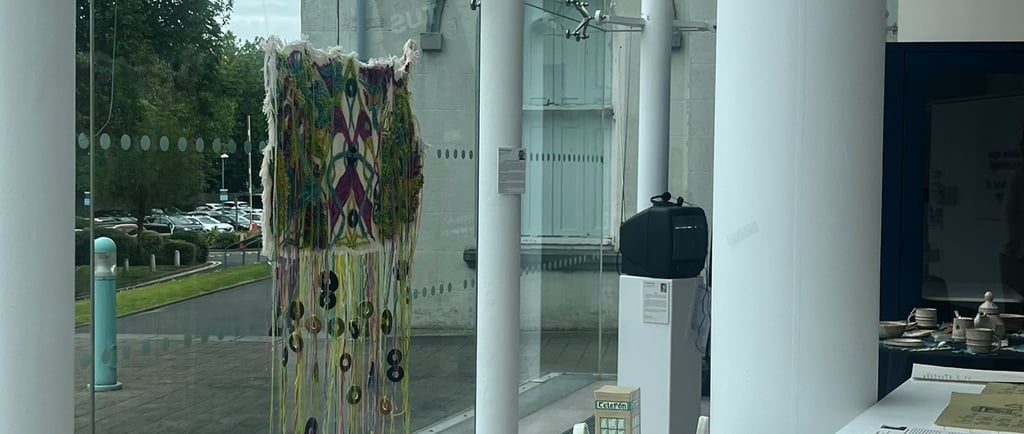Reweaving the Future: Reflections from Connected Threads 2025
I recently attended the Connected Threads seminar at Limerick School of Art & Design, where designers, makers, and innovators came together to explore the future of sustainable textiles in Ireland. From digital twins and circular fashion to ethical supply chains and textile repair, the event was packed with insight and action. Here's what I learned, who inspired me, and why this conversation matters more than ever.


If Ireland’s fashion and textile industry had a pulse, it was beating loud and clear at the Connected Threads seminar held in Limerick on June 4th. This wasn’t just another industry event. It was a convergence of designers, makers, and policy drivers rallying around sustainability, circularity, and innovation. Hosted by the Limerick School of Art & Design, it brought together the people who are actively rethinking how we clothe ourselves and at what cost.
The Council of Irish Fashion Designers opened with a compelling message. The real issue in fashion isn't just how we produce, but how much we consume. Chaired by Eddie Shanahan, with designers like Anxhela Cerriku, Heidi Higgins, and Christine Murphy, the panel pushed for a shift in mindset. Eddie Shanahan spoke frankly about greenwashing, such as brands claiming to recycle fishing nets while doing little else, and the barriers that still exist when trying to create sustainable garments, like the lack of biodegradable yarns or incentives for upcycled collections. He argued for stronger support and clearer language around sustainability, reminding the audience that consumers don’t want waste, they want value.
Lucy Clarke from We Make Good shifted the focus to people, describing how their model isn’t built on charity but on real opportunities. The organization hires refugees and former prisoners, offering not only jobs but dignity. They sell services and products just like any other business, with a goal of creating a more equal Ireland where everyone is part of the workforce. It was a clear reminder that sustainability is not just about materials but systems.
Adam Hankin of Gemell brought in a digital perspective that felt both shocking and necessary. He revealed that the global textile industry is still relying on 20-year-old design software, with weaving loom changes taking up to 11 hours. One Turkish mill alone was responsible for 160 kilometers of fabric sample waste just from product development. Gemell’s solution is to create digital twins, virtual versions of fabrics that support better manufacturing decisions, reduce sample waste, and enable pre-sales before physical production. This is not just about efficiency. It is a transformation. He also touched on emerging trends like virtual try-ons and digital garments, highlighting how data can drive better design outcomes.
Ambriel Pouncy, founder of the Fusion Fashion Tech Society, added a global and ethical layer to the conversation. She questioned what luxury really means, contrasting high-end products like Vicuña wool with polycentric governance and indigenous land management. She called for ethical shearing, sustainable rural production, and the integration of technologies like blockchain and AI to track environmental impact and ensure humane supply chain practices. Her vision included Digital Product Passports, tools that not only ensure traceability but empower communities through transparency.
Katie Walsh of The RE-PETE Project brought a practical, circular example. Her garments are made using recycled materials like coffee cup lids and 28 plastic bottles per item. Her factory is B Corpe certified and 2%of revenue goes directly to The Ocean Cleanup. But it’s not just about the clothes. Her team runs monthly beach cleanups and pushes for awareness around the fact that fashion is the world’s second largest polluter after oil. Her approach blends action, design, and accountability in a way that feels personal and powerful.
Other speakers including Caoimhe Dowling, Chris Weinger from Donegal Yarns, and Sam Goates from Woven in the Bone reminded us that tradition has a place in innovation. Their work connects Irish textile heritage with contemporary needs, exploring how openness and experimentation can keep crafts alive while solving today’s challenges. There was a refreshing honesty in how they discussed failure, success, and the importance of space to try.
Ireland currently produces the most textile waste per person in the EU, by 35%. And despite a growing demand for skilled repair, there hasn’t been a professional-level textile repair training course in the country. That is beginning to change. One initiative shared during the seminar is the launch of Ireland’s first professional textile training programme, which includes projects like uniform repurposing for companies like An Post and Bus Éireann. Since most uniform suppliers don’t offer recycling services, this kind of creative reuse is an essential step forward.
The event closed with a feeling of cautious optimism. The energy in the room was rooted in action. People aren’t just talking about change, they are making it. Whether through slow fashion jeans guaranteed for five years, upcycled seasonal fabrics, or efforts to design more ethical systems from the ground up, the future of textiles in Ireland is being rewoven thread by thread.
